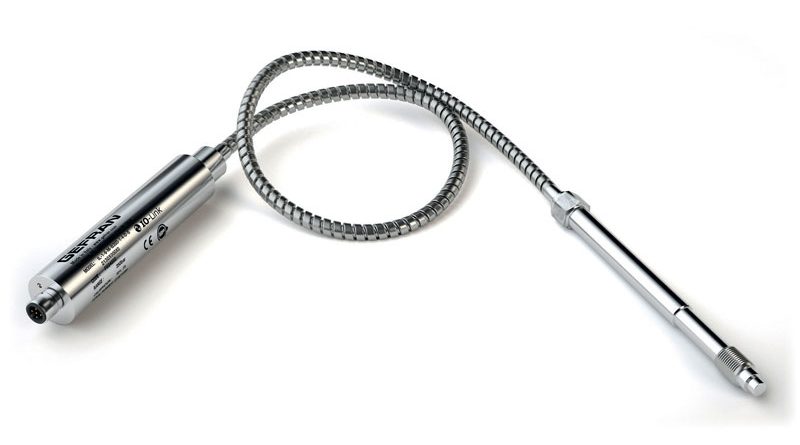Connected, Green Solutions for Plastics Processing
Gefran’s portfolio of solutions includes a wide range of products for plastics processing machines. Besides Melt pressure sensors and Hyperwave position sensor with magnetostrictive technology, an App for the measurement of column deformation and wireless load cells, both developed by Sensormate, part of Gefran Group.
by Alma Castiglioni
Gefran production programme includes a number of innovative products for the plastics processing industry. The last event in which they were presented is the K 2019 in Düsseldorf where the company took the opportunity to present also the new corporate identity. During the fair, in fact, the new payoff was announced: Gefran, Beyond Technology, a signature that underlines the company’s willingness to look beyond technology while highlighting all the aspects that underpin our growth, with a perspective on the market of tomorrow.
Melt pressure sensors are now available with IO-Link connectivity
The new Melt pressure sensors with digital output IO-Link version 1.1, specifically designed to meet the needs of connectivity, factory data acquisition, monitoring and predictive maintenance, typical of the industry 4.0 were among the highlights of Gefran’s presence at the trade fair: a complete family certified PLd and SIL2, which guarantees constant, high and repeatable quality of the product and the best sustainability. Gefran developed fluid free sensors or that use NaK transmission fluids or oil to reduce carbon footprint.
On show also Gefran’s renewed range of Melt pressure sensors dedicated to polymer extrusion. The transmitters of the HIX series (HART – IMPACT – ATEX), with HART communication protocol for use in high temperature environments and applications in potentially explosive atmospheres by virtue of ATEX certification and PLc and SIL2 security certification. IMPACT sensors are distinguished by a piezoresistive operating principle and a transmission system without filling fluid, withstanding working temperatures of up to 350°C. Through a contact membrane up to 15 times thicker than the traditional versions, the pressure is transmitted directly to the sensitive element that has a micro-worked silicon structure (MEMS). The series, with current output signal, covers a pressure range from 0…10 bar to 0…1.000 bar, making it the ideal choice for the extrusion of low-viscosity plastics. Another advantage of these solutions is the quick installation, thanks to the ready-to-use flanges offered by Gefran.
The family consists of two further models whose construction principle is based on the hydraulic transmission of pressure and the transfer of mechanical stress by means of an incompressible liquid. In detail, the KE series is characterized by a mixture of Sodium + Potassium (NaK) that allows the sensor to withstand up to 538°C and the ME series that uses mercury as transmission fluid, is used in cases allowed by the European Directive 2011/65/EU – RoHS II in environments with temperatures up to 400 °C. SIL2 certification makes the products suitable for Functional Safety applications and is particularly essential in process plants for the production of polymers.
The new Gefran series of Melt pressure sensors for polymers are able, through an internal self-compensation, to cancel the effect of pressure signal variation caused by temperature variation, thus eliminating the typical reading error of traditional sensors, caused by the heating of the filling fluid.
Precision and repeatability in measurement in injection moulding
Another sensor ideal for the injection moulding sector and, more in general, where maximum precision and repeatability of measurement are required, is Gefran’s HYPERWAVE based on the magnetostrictive technology that uses the sonic wave with a high level of performances.
Its detection system ensures a repeatability of 0.01 mm (hundredth of a millimeter) with a very low non-linearity error of 0.01%/FS and a resolution of less than 0.5 µm, even operating at extreme temperatures from -30 °C to +90 °C. The amplification of the primary element signal, 15 times higher than traditional models, makes the non-contact transducer immune to the typical electromagnetic fields present in industry, thus ensuring a precise and continuous operation over time. The longer service life, together with the absence of maintenance, is one of the strengths of the new Gefran solution compared to traditional measuring systems. By virtue of the magnetostrictive technology, the mechanical contact is eliminated, thus making the system practically immune to wear and significantly reducing machine downtimes.
This range is certified cULus and is divided into two macro-categories: WP (Profile Magnetostrictive Position Transducer) and WR (Rod-style Magnetostrictive Position Transducer).
A wireless system measuring column deformation and moulds closing
At K 2019 Gefran showcases a couple of novelties developed by Sensormate, part of the Gefran Group: the Inspectmate App for QE1008-W and the WLC loading cells.
Sensormate QE1008-W consists of a new suite of software and a renewed hardware to further improve and simplify the use of the deformation sensor with magnetic mounting Sensormate QE1008-W.
Chosen by many of the leading machine builders and injection moulders to measure column deformation and at the same time the strength of moulds closing, the QE1008-W is now completely wireless to respond effectively to the needs of smart factories.
In detail, thanks to the App available for Android, Windows 10 and soon also for IOS, the signal coming from the sensors is received wirelessly with ZigBee open source protocol and forwarded via Bluetooth to a PC or mobile devices such as smartphones or tablets.
The association of QE1008-W sensors with the receiver through the App greatly simplifies the processes. For example, you can replace a sensor in a matter of seconds in the event of a fault, or easily create ad hoc configurations for different measurement tasks. The App has numerous new features designed to support the user and facilitate data logging and storage processes. The flexible display of the measurement diagram allows for dynamic measurements, which can be exported as data files for further processing and analysis.
Let’s conclude with the WLC Sensormate load cells, wireless sensors designed for measuring the counter-thrust force of the injector.
The injection strength is the most important feature in the moulding process from which the productive repeatability is derived: the sensors monitoring these values are at the heart of full-electric injection moulding machines.
In this sense, the wireless load cell WLC is characterized by the absence of electrical connection between the injector and the reader and, to ensure maximum accuracy, it is designed for mounting directly behind the screw.

